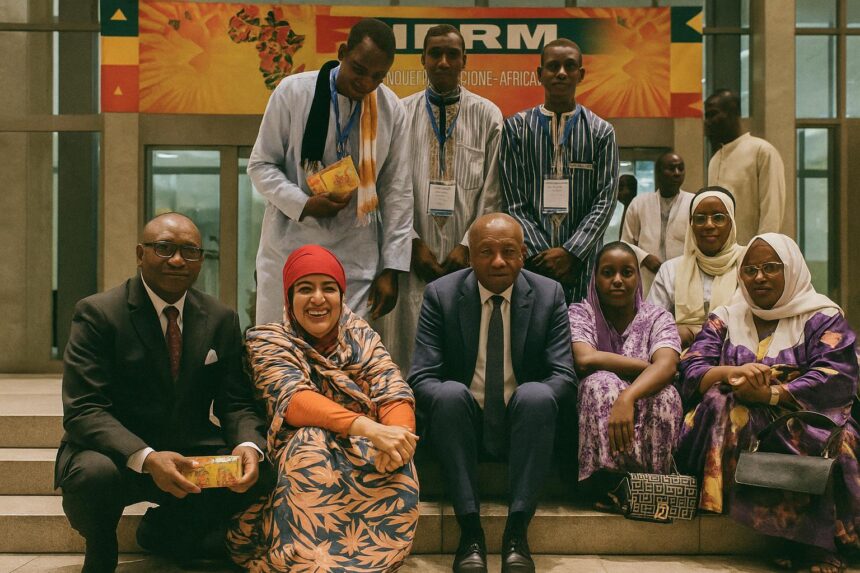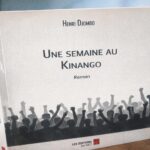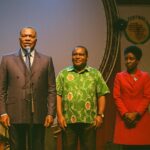A festive overture with diplomatic overtones
On 19 July, the lights of the Palais des Congrès in Brazzaville dimmed before an audience of regional dignitaries, cultural entrepreneurs and foreign correspondents. The twelfth edition of the Pan-African Music Festival, better known by its French acronym Fespam, had officially begun. Representing UNESCO, Resident Coordinator Fatoumata Barry Marega delivered a greeting that blended protocol with enthusiasm, echoing a video message from Director-General Audrey Azoulay, who commended the Republic of the Congo for maintaining, despite a demanding international context, a forum where the continent’s sonic traditions and contemporary rhythms may converse freely.
Azoulay’s tribute to the late Malian virtuoso Amadou Bagayoko established a tone of reverence, while her emphasis on music as a “language beyond words” offered a reminder that Fespam is not mere spectacle but a laboratory of cultural diplomacy. The event, scheduled through 26 July, gathers more than thirty orchestras and choirs from across Africa, Europe and the Caribbean, transforming Brazzaville into a temporary capital of musical multilateralism.
Congo-Brazzaville’s creative economy agenda
For the host government, the festival dovetails with a broader policy matrix designed to diversify the national economy and project a benign international image. President Denis Sassou Nguesso’s Plan National de Développement 2022-2026 places the creative industries alongside forestry and digital services as vectors for post-pandemic recovery. By underwriting Fespam’s logistical infrastructure, authorities signal a conviction that cultural capital can mature into financial capital without sacrificing authenticity.
Officials from the Ministry of Culture cite rising visitor numbers—nearly 300 000 in 2019 according to festival archives—as evidence that the initiative contributes tangible revenue to hotels, restaurants and transport operators. More subtly, the festival nurtures an ecosystem of local sound engineers, set designers and intellectual-property lawyers whose expertise anchors Brazzaville’s aspiration to become a sub-regional service hub.
The rumba accolade and its ripple effect
UNESCO’s inscription of Congolese rumba on the Representative List of the Intangible Cultural Heritage of Humanity in 2021 marked a watershed for cultural stakeholders on both banks of the Congo River. The decision, propelled by a joint dossier submitted by Brazzaville and Kinshasa, recognised rumba’s historical role as a soundtrack to decolonisation and social cohesion. Analysts at the African Music Institute note that the listing has stimulated at least twenty new rumba academies across Central Africa, each eligible for micro-grants from UNESCO’s Intangible Heritage Fund.
Firmin Édouard Matoko, then UNESCO Assistant Director-General for Priority Africa, shepherded the candidacy dossier through a labyrinth of expert panels. His attendance at Fespam this year, now as a candidate for the organisation’s top post, carries symbolic weight. By anchoring his campaign in Brazzaville, he associates his leadership credentials with a success story that resonates well beyond Central Africa.
Soft power chords in a polyphonic region
Brazzaville’s cultural overtures unfold against a complex geopolitical pentagram. The Gulf of Guinea security agenda, climate-driven migration and fluctuating hydrocarbon prices all compete for regional attention. Within that cacophony, the serenity of a guitar riff or the cadence of a traditional likembe offers a diplomatic respite, allowing policymakers to engage one another in an atmosphere less adversarial than the usual conference hall.
Foreign ambassadors present at the opening ceremony described the festival as a rare opportunity to conduct informal diplomacy. A senior European envoy remarked that conversations backstage often succeed where formal negotiations stall, because “a shared melody lowers the temperature of even the thorniest dossier”. Such anecdotal evidence supports scholars who argue that cultural platforms can complement, though not replace, conventional statecraft.
Charting future harmonies
As the final notes prepare to fade on 26 July, organisers are already drafting a post-festival roadmap. A joint communiqué from UNESCO and the Congolese Ministry of Culture proposes a touring exhibition on the history of African protest songs, scheduled to visit Dakar, Addis Ababa and Lisbon before returning to Brazzaville in 2025. The itinerary aligns with the African Union’s Agenda 2063 and with the European Union’s Global Gateway, illustrating how cultural projects can bridge policy frameworks across continents.
Whether or not Firmin Édouard Matoko secures the directorship of UNESCO, his presence at Fespam underscores a broader consensus: that cultural heritage, once regarded as a domain of nostalgia, has become an instrument of forward-looking governance. For Congo-Brazzaville, the melody is clear: invest in the arts, amplify regional goodwill and let the world listen.




















